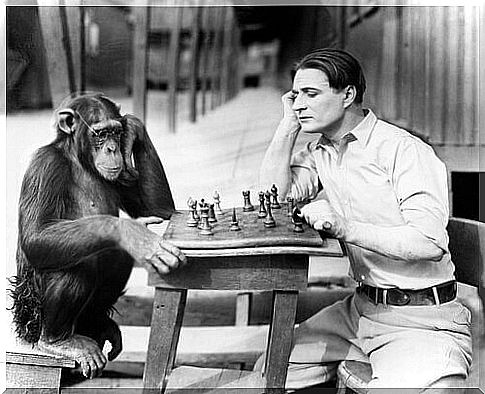Did You Know That Animals Also Have Culture?

Discussing animal culture is important to understand that not only humans have special abilities. There are even species that, like us, are capable of using tools or employing curious hunting techniques.
We live in an anthropocentric society, in which the human being is not only the center of everything, but also the measure of things.
Therefore, throughout history, we have developed the belief that we are superior to the rest of animals.
Humans are not unique
And we must not forget that we are animals. Exceptional animals and different from the others, but still very similar.
In this way, certain characteristics that we believe to be human are not unique to us.
One example is the practice of using tools. Fifty years ago, human beings were defined by their ability to manufacture and use tools.
However, Jane Goodall found that chimpanzees can do this too.
When Goodall called his mentor, Louis Leakey, he assured her that it was now possible to change the definition of human or even grant chimpanzees the status of a person.
What is culture?
This was just one example of the numerous occasions when a trait believed to be uniquely human was proven to be the behavior of other animals. Animal culture is a good example of this.
Culture can be defined as certain knowledge and behavior of a social group, transmitted from generation to generation.
In other words, it is not just a behavior that a species necessarily shares, but also a behavior transmitted within the same group or region.
Culture in animals: non-human primates
This concept of culture can be seen in many animals. Probably, the first evidence came from studies with Japanese monkeys, which showed different behaviors.
Some monkeys that lived on the beach cleaned their legs in seawater, while others did not.

While the examples of animal culture do not reach the complexity of human cultures, many are surprising.
The different cultures of chimpanzees have been extensively studied. Some groups hunt with sticks, while others use leaves to drink or stones to crack nuts.
The culture of cetaceans
Undoubtedly, another group of animals in which the presence of culture has been studied is that of cetaceans.
Killer whales, dolphins, whales and porpoises are animals with surprising behaviors that have a huge cultural component.
Orcas are a great example. Nowadays, we do not consider that there is only one species of orca, but that there are different subgroups.
Furthermore, studies show that different groups of orcas on the planet have different behaviors.
Killer whales can even organize themselves in different ways, varying the structure of the groups.
Surprisingly, among orcas groups, there can be different dialects, as if these animals had languages.
A comparison can be made with the human being, who communicates with each other through languages.
Another example of animal culture and present in the behavior of orcas is the use of different hunting techniques.
While some orcas go to the beach to hunt seals, others look for ice banks and even attack flocks of fish in groups.

Animal culture is still unexplored
In addition to primates, other mammals have been shown to have culture. For example, Joseph Terkel discovered how black female rats teach each other to peel pineapples for food. Furthermore, they pass this ability on to subsequent generations.
Even some birds have shown to have cultural behaviors. Jaws seem to have regional dialects and perform distinct flight patterns.
There are usually several distinctive dialects in many bird species, such as robins and sparrows.
The truth is that there are many species with all kinds of surprising cultural behaviors. We can’t cover them all in this article, but we also mention elephants and parrots.
What is clear is that there is still a lot to discover about the animal world. So we must remember that we are not as unique and special as we thought.









